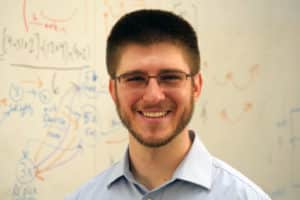The award is given to undergraduate and graduate students who have demonstrated outstanding leadership and service.
John Meluso, PhD received the Distinguished Leadership Award for Diversity, Equity and Inclusion, for his strong leadership and communication abilities in the Design Science program. Nominated by Program Director for Design Science, Nigel Melville, the award is given to undergraduate and graduate students who have demonstrated outstanding leadership and service to the College, University, and community.
“John is a clear leader among his peers, going the extra mile to do all the little things that support leaders,” Nigel said. “Truly an unsung hero!”
John is originally from Colorado and received his Bachelor’s degree in Engineering Physics at Cornell University. John wanted a degree that offered something practical and theoretical at the same time, so he could see how the world works and then use this knowledge to help people. He found his passion for interdisciplinary work throughout his undergraduate career. John also had a concentration in Development Sociology during his undergraduate studies and began combining how the world works from a physics perspective with how people work together from a sociological perspective.
After graduating, John worked at Orbital Sciences as a consultant where he found that the hardest problems the company faced weren’t the math and physics, but questions of how do you coordinate people, and how can teams overcome differences of values to get to a common goal and communicate effectively. Seeing this pushed John to pursue his masters. During undergrad and while working in the industry, the presence of the University of Michigan (U-M) was everywhere. John knew people everywhere that had degrees from U-M, they were all capable and competent. He was impressed by their work and what they could get done. What really set U-M apart for John was the ability to do this interdisciplinary work in the Design Science program.
“There are a small number of universities who really have this ability. Being able to come here and work on interdisciplinary projects and work with experts in all these different fields was a dream come true,” John said.
Nowhere else seemed to embrace qualitative and quantitative methods. The expertise in the subjects was all here in Design Science, a program which encourages students to combine two different disciplines. John’s work integrated systems design through the College of Engineering with management and organizations through the Ross School of Business, plus a certificate in complex systems through the College of Literature, Science, & the Arts. Design Science allowed John to combine approaches and methods from these disciplines to understand how organizations shape the evolution of complex systems.
“I couldn’t have accomplished what I have without Design Science,” said John. “I’m optimistic that my work will have a positive impact on the world.”
John successfully defended his dissertation in March 2020. His dissertation looks at miscommunication in networks and how it affects the performance of organizations. John’s upcoming work tries to understand how different organizational cultures can improve performance. In early May, John began a position as the OCEAN Post-Doctoral fellow at the University of Vermont’s Complex Systems Center, one of the up-and-coming centers studying complex systems. John’s postdoc will look at how people communicate within organizations and specifically virtual collaboration.
